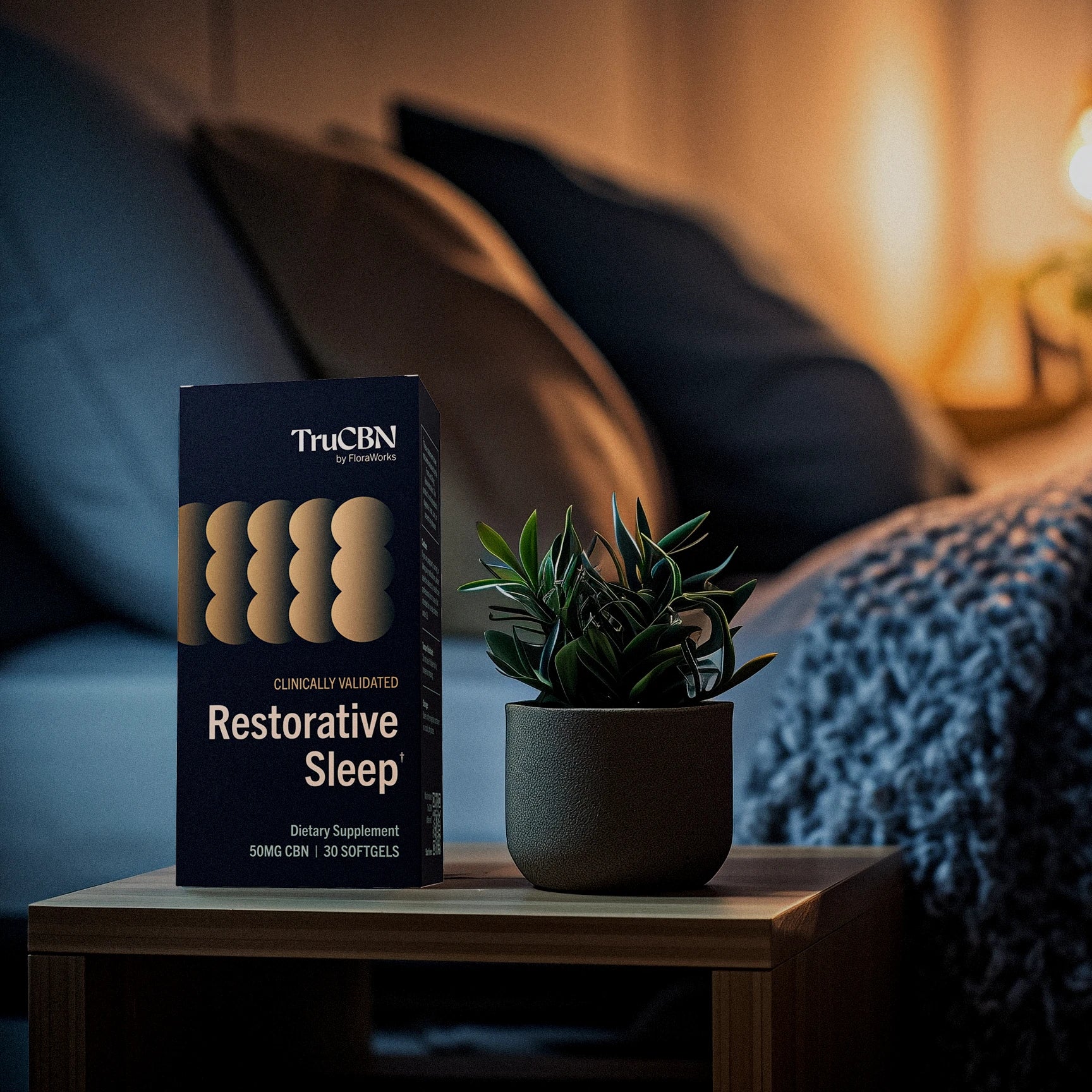How Quality Sleep Reduces Stress and Supports a Balanced Life

Stress is a defining aspect of modern life, significantly impacting health, relationships, and productivity. While many people turn to exercise, mindfulness, or therapy to manage stress, one of the most natural and effective remedies is often overlooked: quality sleep.
Sleep is a fundamental biological process that regulates hormones, repairs the body, and restores the mind. It is especially critical for managing cortisol—the body’s primary stress hormone—and improving resilience, emotional regulation, and cognitive function. When sleep is compromised, stress levels rise, creating a vicious cycle that can have lasting effects on overall well-being.
This guide explores the relationship between sleep and stress, offering actionable advice supported by research-backed insights. It also introduces TruCBN, a natural sleep aid designed to promote deep, restorative rest.
The Stress-Sleep Cycle: A Vicious Loop
Stress and sleep are deeply intertwined. Stress disrupts sleep by elevating cortisol levels and overactivating the mind, making it difficult to relax. Conversely, insufficient sleep increases stress by impairing emotional regulation and reducing the ability to cope with daily challenges.
According to the American Psychological Association (APA), nearly half of adults report that inadequate sleep heightens their stress levels, while 35% say stress interferes with their sleep quality.
Breaking this cycle requires addressing both stress and sleep simultaneously. Quality sleep serves as a natural reset for the body’s stress-response system, calming the nervous system and lowering cortisol levels, as noted by the National Sleep Foundation.
Cortisol: The Stress Hormone and Its Impact on Sleep
Cortisol, often referred to as the “stress hormone,” plays an essential role in the body. Produced by the adrenal glands, it regulates metabolism, blood pressure, and immune response. However, when cortisol levels remain elevated due to chronic stress, the hormone begins to disrupt sleep and overall health.
The Natural Cortisol Cycle
Cortisol follows a circadian rhythm, peaking in the early morning to promote wakefulness and gradually declining throughout the day to prepare the body for rest. Chronic stress or disrupted sleep patterns, however, can lead to elevated nighttime cortisol levels, preventing the body from entering deep, restorative sleep.
Research published in The Journal of Clinical Endocrinology & Metabolism demonstrates the correlation between elevated cortisol levels at night and insomnia, highlighting how this stress hormone can perpetuate poor sleep quality.
The Long-Term Effects of Elevated Cortisol
When cortisol remains chronically elevated, it increases the risk of serious health problems, including:
- Cardiovascular Disease: Elevated blood pressure and heart disease are closely linked to chronic stress and poor sleep.
- Mental Health Issues: Anxiety, depression, and mood disorders can result from sustained cortisol dysregulation.
- Weakened Immunity: Prolonged stress impairs immune function, leaving the body more vulnerable to illness.
Findings from the National Institutes of Health (NIH) show that sleep is critical for maintaining balanced cortisol levels and protecting long-term health.
How Sleep Reduces Cortisol
Sleep is one of the most effective natural regulators of cortisol. During key sleep stages, the body actively lowers cortisol levels, promoting recovery and preparing for the challenges of the next day.
Slow-Wave Sleep: Deep Recovery
Slow-wave sleep, the deepest stage of non-REM sleep, is when cortisol levels drop to their lowest. This phase is essential for repairing tissues, strengthening the immune system, and restoring the stress-response system. The National Sleep Foundation notes that slow-wave sleep is critical for reducing both physical and emotional stress.
REM Sleep: Emotional Regulation
REM sleep is the stage during which most dreaming occurs, and it plays a key role in processing emotions. Dr. Rosalind Cartwright, a leading sleep researcher, explains that dreaming helps individuals work through emotional challenges and build resilience. Her research, published in Sleep Medicine Reviews, highlights how REM sleep reduces the emotional intensity of stressful events, improving emotional balance.
Emotional Regulation and Stress Relief
One of the most significant benefits of sleep is its ability to enhance emotional regulation. This critical brain function helps individuals manage and respond to stress effectively.
How Sleep Supports Brain Function
Sleep restores communication between the brain's prefrontal cortex, which governs rational thinking, and the amygdala, the center of emotional processing. When sleep is insufficient, the amygdala becomes hyperactive, leading to exaggerated emotional responses. Research in Annual Review of Clinical Psychology shows that just one night of sleep deprivation significantly disrupts this balance, increasing stress and anxiety.
Conversely, high-quality sleep enables the brain to process emotions effectively, reducing overreactions and improving resilience to stressors.
How Poor Sleep Exacerbates Stress
When sleep is inadequate, the body and mind struggle to manage stress, creating a snowball effect that impacts daily life.
Cognitive Impairment
Sleep deprivation directly affects cognitive abilities, including decision-making, memory, and focus. Findings from Harvard Medical School reveal that sleep-deprived individuals are more likely to make mistakes and struggle with problem-solving, which can amplify workplace stress and personal challenges.
Physical Health Impacts
In addition to its mental effects, sleep deprivation compromises physical health. It increases inflammation, weakens the immune system, and disrupts hormones that regulate appetite and metabolism. The APA emphasizes that restorative sleep is essential for protecting against stress-related illnesses.
Breaking the Stress-Sleep Cycle
Overcoming the stress-sleep cycle requires a proactive approach that addresses both issues simultaneously. Here are some evidence-based strategies to improve sleep and reduce stress:
1. Establish a Consistent Sleep Schedule
Maintaining a regular bedtime and wake time helps regulate your body’s internal clock, making it easier to fall and stay asleep. According to the Centers for Disease Control and Prevention (CDC), consistency is one of the most effective ways to improve sleep quality.
2. Create a Relaxing Pre-Bed Routine
Developing a bedtime routine that includes calming activities like reading, stretching, or meditation can signal to your body that it’s time to wind down. Avoid stimulating activities, such as scrolling on your phone, at least 30 minutes before bed.
3. Optimize Your Sleep Environment
A comfortable and quiet sleep environment is critical for restorative sleep. The National Sleep Foundation recommends minimizing noise, blocking out light, and maintaining a cool room temperature (60–67°F) for optimal rest.
4. Manage Daytime Stress
Incorporating mindfulness practices like deep breathing, yoga, or journaling into your daily routine can lower cortisol levels and make it easier to relax at bedtime. Apps like Calm and Headspace provide guided exercises to help you de-stress.
The Benefits of Restorative Sleep for Stress Management
Restorative sleep is a cornerstone of stress management. It allows the body to repair, the mind to process emotions, and hormones to reset, creating a solid foundation for mental and physical well-being. Without quality sleep, stress can snowball into chronic issues that affect every aspect of life.
Improved Emotional Regulation
Restorative sleep enhances the brain’s ability to regulate emotions, making it easier to handle stress. When sleep-deprived, the brain’s emotional processing center, the amygdala, becomes hyperactive, leading to exaggerated responses to challenges. At the same time, the prefrontal cortex, responsible for rational decision-making, becomes less active.
Research published in AIMS Neuroscience found that sleep-deprived individuals are more likely to experience mood swings, heightened anxiety, and difficulty managing stressful situations. Restorative sleep restores the balance between these brain regions, enhancing emotional resilience and overall mental health.
Reduced Inflammation
Chronic stress and poor sleep contribute to inflammation, which is linked to conditions such as heart disease, diabetes, and depression. During restorative sleep, cortisol levels drop, reducing inflammation markers and promoting healing. The Mayo Clinic highlights that quality sleep is essential for combating the physical effects of stress and maintaining overall health.
Strengthened Immune Function
Sleep is critical for immune health. The body uses restorative sleep to repair cells, produce infection-fighting proteins, and strengthen its defenses against illnesses. Poor sleep weakens the immune response, leaving the body more vulnerable to stress-related health problems.
TruCBN: A Natural Solution for Better Sleep
For individuals struggling to achieve restorative sleep, natural supplements like TruCBN offer an effective and safe option. TruCBN is a cannabinoid-based sleep aid designed to promote relaxation and improve sleep quality without causing dependency or grogginess.
How TruCBN Works
-
Supports Circadian Rhythms
TruCBN helps regulate the body’s internal clock, making it easier to fall asleep and wake up feeling refreshed. -
Promotes Deep Sleep
By calming the nervous system, TruCBN facilitates the transition into slow-wave sleep, the most restorative phase of the sleep cycle. -
Non-Habit Forming
Unlike traditional sleep aids, TruCBN is non-addictive, making it a sustainable solution for long-term use.
Cannabinoid Research and Sleep
Emerging studies highlight the potential of cannabinoids, including cannabinol (CBN), in supporting sleep. Research shows that cannabinoids interact with the body’s endocannabinoid system, which regulates processes such as mood, sleep, and stress responses.
Building a Sleep-Friendly Lifestyle
While supplements like TruCBN can enhance sleep quality, lifestyle adjustments are equally important for long-term improvements. Here are actionable strategies to create a sleep-friendly routine:
1. Optimize Your Sleep Environment
Creating the right environment for sleep is essential for quality rest. The National Sleep Foundation recommends:
- Darken the Room: Use blackout curtains or a sleep mask to block light.
- Reduce Noise: Incorporate white noise machines or earplugs to minimize disruptions.
- Set the Right Temperature: Aim for a room temperature of 60–67°F, which is ideal for sleep.
2. Limit Stimulants
Caffeine and sugar can interfere with the body’s ability to wind down. To promote better sleep, avoid consuming stimulants at least six hours before bedtime. The National Institute on Aging also advises against alcohol close to bedtime, as it disrupts sleep cycles.
3. Follow a Consistent Sleep Schedule
Going to bed and waking up at the same time each day helps regulate the body’s natural sleep-wake cycle. Consistency trains the brain to anticipate sleep, making it easier to fall and stay asleep.
4. Incorporate Relaxation Techniques
Mindfulness practices such as yoga, meditation, or progressive muscle relaxation can lower cortisol levels and prepare the body for rest. Apps like Calm and Headspace provide guided relaxation exercises tailored for sleep.
Diet’s Role in Stress and Sleep
What you eat can significantly impact your ability to manage stress and sleep well.
Foods That Promote Relaxation
- Magnesium-Rich Foods: Spinach, almonds, and avocados help relax muscles and nerves.
- Tryptophan-Rich Foods: Turkey, eggs, and dairy support melatonin production, helping the body regulate sleep.
Foods to Avoid
Caffeine, spicy foods, and heavy meals before bed can disrupt sleep. The American Sleep Association recommends eating a light snack if needed, such as a banana or a handful of nuts.
Exploring the Role of Dreams in Stress Relief
Dreaming, especially during REM sleep, plays a powerful role in managing stress. Dreams allow the brain to process unresolved emotions and make sense of challenging experiences.
Dr. Rosalind Cartwright, a leading sleep researcher, explains that dreams act as a form of emotional therapy, enabling individuals to work through stress subconsciously. Her work underscores the importance of uninterrupted REM sleep for emotional health.
Long-Term Benefits of Prioritizing Sleep
Investing in quality sleep offers numerous long-term benefits for mental, emotional, and physical well-being:
Improved Heart Health
Sleep helps regulate blood pressure and reduce the risk of heart disease. Studies from the Centers for Disease Control and Prevention (CDC) show that adults who consistently get 7–9 hours of sleep are less likely to develop cardiovascular problems.
Enhanced Cognitive Performance
Restorative sleep boosts memory, problem-solving skills, and creativity. Research from Harvard Medical School highlights how sleep supports long-term learning and mental clarity.
Increased Longevity
Individuals with consistent, high-quality sleep patterns are more likely to live longer, healthier lives. A study in PLOS Medicine (explore it here) found that sufficient sleep significantly reduces the risk of chronic diseases associated with aging.
Conclusion
Restorative sleep is a powerful tool for managing stress and promoting overall health. By combining lifestyle adjustments, relaxation techniques, and natural sleep aids like TruCBN, you can break the cycle of stress and sleeplessness. Prioritize your rest today to unlock the benefits of a calmer, healthier tomorrow.





